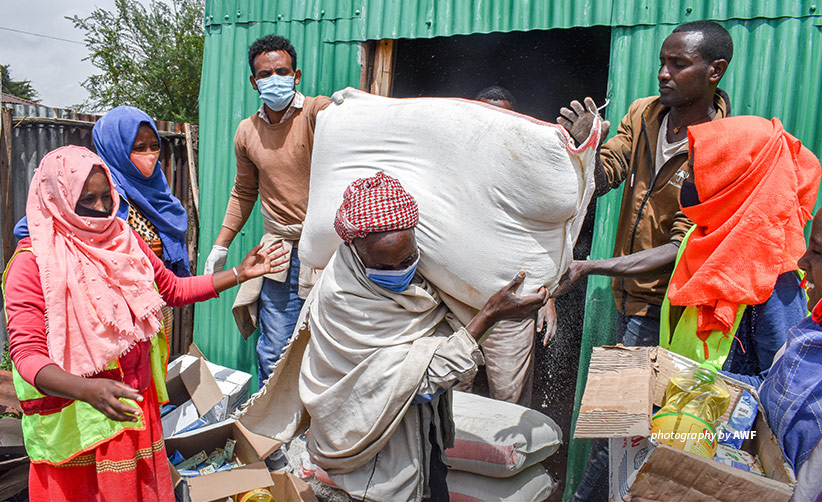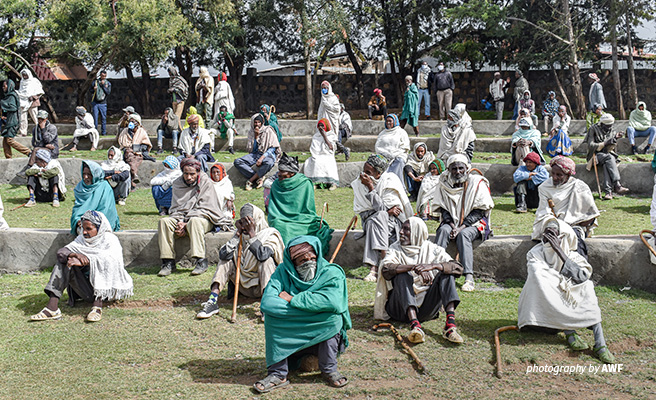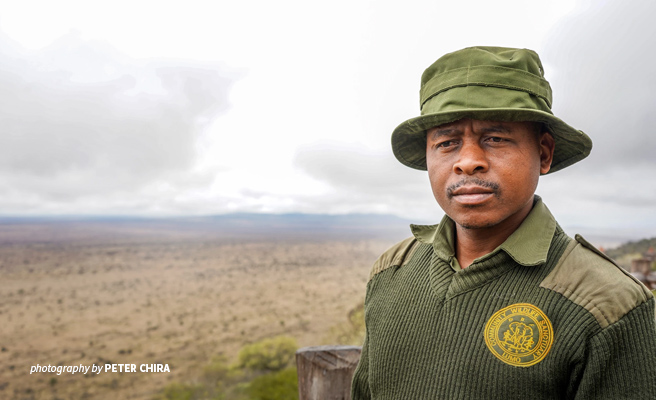Tourism-dependent communities find a new lifeline

When African Wildlife Foundation designed its response to the COVID-19 pandemic, the organization knew that focusing only on wildlife and wild lands would fall short of mitigating the ongoing crisis. Our decades of experience in conservation in Africa continue to show that even the best designed conservation programs do not succeed when the needs of the communities living near wildlife remain unaddressed.
Therefore, AWF made an important decision: on top of providing support for protected area management, the organization would also focus its interventions on local communities, ensuring that the people living adjacent to protected areas are cared for even as the pandemic sweeps through the continent, flattening rural economies and leaving scores hungry.
Since April, AWF’s field teams have been busier than usual, distributing health and safety resources to communities and governments fighting to limit the spread of COVID-19. In Ethiopia’s Simien Mountains landscape, AWF’s ecologist Tibebu Simegn and his team have been distributing food rations to the vulnerable Gich community living at the periphery of the Simien Mountains National Park. Simegn’s team is also organizing a cash-for-work program that has seen hundreds of community members get paid to maintain the park.
Their activities include picking up trash and clearing invasive weeds as well as repairing fences and other park infrastructure. Despite the lack of tourists visiting the Simiens, the park is not falling into disrepair. AWF believes that once the threat of COVID-19 has passed, the national park will be in good condition to start receiving visitors again.
“We are targeting 566 individuals for the cash-for-work program. Not only are they cleaning the park and campsites up, they are also preparing tree nurseries and we’ve acquired seedlings so that they can start planting. We want to leave this park better than it was,” says Simegn.
Abera Aman, a member of the Gich community who calls this rugged landscape home, speaks about the impacts of the ongoing COVID-19 pandemic.
“Because of COVID-19, we are unable to go about our day-to-day income-generating activities, such as weaving. All of us are in serious trouble. So we are very grateful to the support from AWF. This support ensures the survival of many community members,” he says.

Members of the Gich community living near Simien Mountains National Park wait for emergency food and heath supplies donated by AWF
Helping communities recover from the collapse of tourism
When the COVID-19 pandemic broke out in early 2020 and governments started tallying positive cases of the disease, no one knew that the world was on the brink of a watershed moment. Wildlife economies in rural Africa have since come undone, digging tourism-dependent communities deep into poverty and food insecurity.
Figures from institutions that track development and economic trends paint a grim picture for the continent.
“As a result of the pandemic, economic growth in sub-Saharan Africa will decline from 2.4 percent in 2019 to between -2.1 percent and -5.1 percent in 2020, depending on the success of measures taken to mitigate the pandemic’s effects. This means that the region will experience its first recession in 25 years,” according to the World Bank.
This means loss of jobs and livelihoods and escalating food insecurity as food prices rise and purchasing power falls.
For the Gich, who heavily rely on subsistence farming and wages from doing casual work in the tourism-reliant landscape, a total cessation of tourism due to the pandemic has led to greater economic vulnerability and distress. Life has always been tough, but the pandemic has only managed to strip away any economic cushioning that the community has been able to build for itself.
This scenario is repeated across Africa.
In Kenya’s Tsavo region, for instance, the ecolodge within the LUMO Community Wildlife Sanctuary has been shut since March when the country announced its first confirmed COVID-19 case. The local community has long depended on tourism to put food on the table and send their children to school, and now jobs and livelihoods are at stake. “I have had to put my staff on unpaid leave until we resume operations,” says Iain Leckie, who operates the Lions Bluff Lodge.
With no revenues coming from tourism, conservation activities in the community-owned conservancy have either been scaled down or suspended, leading to a spike in poaching incidents.
“Operations at the conservancy are at a standstill as a result of zero cashflows. We depend entirely on park fees paid by tourists to run activities like security patrols and community awareness. Due to losses in tourist revenues, security patrols have been suspended and some rangers have been sent home, leading to a spike in poaching incidents,” confirms Fredrick Thuva, the manager at LUMO Community Wildlife Sanctuary.

Community wildlife scouts in the communally owned LUMO conservancy play an important role in human-wildlife conflict mitigation and wildlife monitoring
New frameworks for community empowerment and conservation
This state of affairs sparked AWF’s COVID-19 Emergency Response Plan. The activities under this plan have been designed to protect conservation gains as well as cushion communities against the worst effects of the pandemic. Working with government authorities in eastern, central and southern Africa, AWF is providing support for protected areas through the provision of food, personal protective equipment, and allowances for park rangers and community wildlife scouts to keep security patrols going. In addition, protected area authorities have received fuel for patrol vehicles, handwashing stations, temperature guns and hand sanitizers in order to keep their staff and visitors safe. At the community level, AWF is working to improve food security, access to information about the disease, and access to life-saving gloves, masks, and handwashing stations.
AWF’s senior director for conservation projects and partnerships, Alistair Pole, is the person responsible for coordinating these multi-pronged efforts. He says that the organization has been deliberate in deciding where to focus its efforts for greatest impact, in order to correctly respond to the needs of our partners at this time.
“COVID-19 has challenged us to think differently, reflecting on shifts we can make, on work we can intensify, and on the role we can play in listening to key stakeholders and amplifying their challenges and needs to governments and international donors,” he says.
As African countries begin to ease lockdown measures put in place to limit the spread of the pandemic, many are hopeful that allowing freer movement will bolster trade and inject a much-needed booster shot to African economies, while also keeping the rates of infection down and preventing the mass casualties evidenced in other parts of the world. Through it all, AWF is committed to supporting African governments and filling the gaps to ensure the prosperity of the continent, its people, and its natural resources.